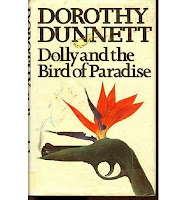Hermione, Countess of Ranfurly defied opinion and a host of regulations to travel to the Middle East during the Second World War to rejoin her husband who was stationed there with his regiment. The 'Whitaker' of the title is her husband's valet, a sort of 'Bunter' figure in the Lord Peter Wimsey tradition, who also accompanied the Ranfurlys to the Middle East in the army.
Anyone without a title or as much sheer front as Lady Ranfurly would have soon found herself despatched home, but she dug in her heels, called in all favours, made herself indispensable to a general or two, and managed to stay in the war arena until the bitter end. The military establishment did, indeed, try to remove her on a number of occasions, once even managing to get her on a boat bound for home. However, she disembarked in South Africa and made her way back by hitching rides by any means she could, including implying that she was on a secret mission! It was a lucky escape - the boat, on which her best friend was also sailing, was sunk soon after she had disembarked.
The diaries reflect her optimism, despite the tragedies around her, that things would work out in the end and that she would be reunited with her beloved husband. Their love shines from the pages. Many of her closest friends were to die, and soon after their reunion her husband was captured at Tobruk and sent to Italy as a prisoner of war for three long and ghastly years until he escaped.
Hermione, Countess of Ranfurly (via wikipedia)
Lady Ranfurly had a useful war: she was a competent typist and obviously an asset as a social organiser (before her marriage she had earned her living as a secretary to the Governor of New South Wales). She was also extremely intuitive which led to her working, for example, for the prototype of the SOE in the Egyptian/Middle Eastern arenas. Once she had made herself indispensible, she travelled about in various war-zones with an astonishing freedom. Her personal courage is beyond doubt and she was stubborn as a mule in achieving her goals. She also met – and sometimes worked with – some of the most interesting personalities in the Middle Eastern arena, such as the appalling Gertrude Bell.
This is a real life Henrietta's War or Mrs Tim of the Regiment, and equally irresistible.
A bookish twist: after the war when her husband was sent to Nassau as Governor of the Bahamas, Lady Ranfurly was instrumental in establishing a service to ship books all over the world, wherever it was thought that a library was needed. This organisation became Book Aid International.
Rating: 10/10.
If you liked this... there is also has another volume of diaries and reminiscences of her childhood, The Ugly One: The childhood memoirs of Hermione, Countess of Ranfurly, 1913–1939 (1998).































